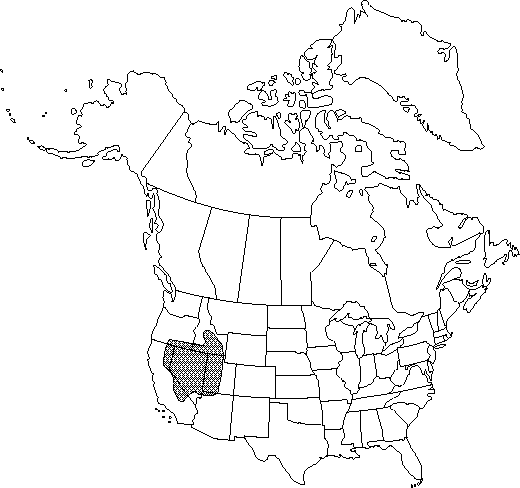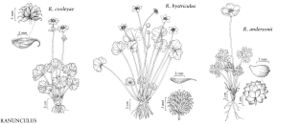Ranunculus andersonii
Proc. Amer. Acad. Arts 7: 327. 1867.
EndemicSelected by author to be illustrated
Synonyms: Beckwithia andersonii (A. Gray) Jepson Ranunculus andersonii var. juniperinus (M. E. Jones) S. L. Welsh Ranunculus andersonii var. tenellus S. Watson Ranunculus juniperinus unknown
Treatment appears in FNA Volume 3.
Revision as of 17:20, 18 September 2019 by FNA>Volume Importer
Stems erect from short caudices, not rooting nodally, glabrous, not bulbous-based. Tuberous roots absent. Basal leaf blades cordate in outline, ternately 1-2×-compound, 1.5-3.8 × 2.1-3.8 cm, leaflets 2-3×-parted, ultimate segments elliptic to linear, margins entire or with occasional teeth, apex obtuse to acuminate. Flowers: receptacle hispid; sepals spreading, 9-15 × 5-9 mm, glabrous; petals pinkish white, 12-18 × 9-13 mm. Fruiting heads globose or depressed-globose, 13-27 × 21-29 mm; fruit wall veined, inflated, not winged, fruits thus utricles; utricles 6-12 × 4-6 mm, glabrous; beak persistent, deltate or subulate from deltate base, 0.2-0.6 mm.
Phenology: Flowering spring (Apr–May).
Habitat: Slopes in sagebrush or pinyon-juniper woodland
Elevation: 900-2300 m
Distribution

Ariz., Calif., Idaho, Nev., Oreg., Utah.
Discussion
Selected References
None.
Lower Taxa
None.
